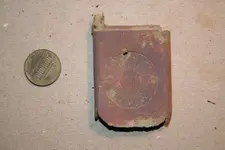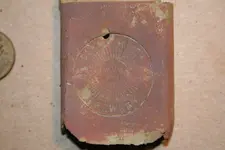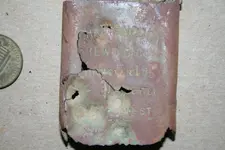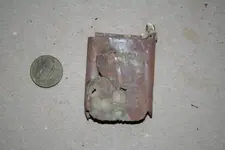Randy769
Full Member
- Joined
- Sep 27, 2013
- Messages
- 116
- Reaction score
- 36
- Golden Thread
- 0
- Location
- S/E Tennesse
- Detector(s) used
- AT PRO
- Primary Interest:
- Relic Hunting
To me this looks like an old Cigarette Lighter but thats just a guess. It says Chattanooga Brewing Co. on one side and Sunny South on the other. Chattanooga Brewing Co. was in Chattanooga from 1892-1909. They bought Sunny South in 1890. My question is: this looks like a lighter but do the dates match up for this modern style type lighter ? If not a lighter then what? If you feel like reading here's some history.
Between 1892 and 1909, the huge Chattanooga Brewing Company covered an entire block of Broad Street between 2nd and 3rd Streets downtown. Charles Reif, the son of a German immigrants from Cincinnati, moved to Chattanooga in 1890 when his father bought the Sunny South Brewery from Conrad Geise.
All brewed well until 1909, when the so-called “drys”—members of the American Temperance Society anxious to stem the tide of alcohol in the state—managed to get a law passed halting “the production of intoxicating beverages for sale in Tennessee.”
Of course, it’s one thing to pass a law and quite another to enforce it, particularly if most people don’t like it, as appears to have been the case. An 1837 report by the Tennessee state legislature on “tippling houses” in Tennessee suggests just how easy it was to sell liquor. That report found that virtually any entertainment establishment had the authority to sell “spirituous liquors.” Liquor licenses, according to the report, were “granted to almost every one applying . . . enabling all who chose, to indulge occasionally in a social glass.” This situation seemed in line with the desires of Tennessee’s citizenry. As the report noted, “Scarcely an instance of complaint was heard, that the rights and privileges of any citizen were curtailed, or his liberties infringed upon.”
That most people not only didn’t like Tennessee’s 1909 anti-liquor law, but often ignored it, is borne out by Paul Isaac, in his history of the period. According to Isaac, enforcement of the unpopular law required periodic “clean-up campaigns.” One such campaign was carried out in Chattanooga in February 1911, when “one hundred and seventy-five persons, including three members of the city council, were indicted, and the next year over a hundred more were fined, for selling intoxicants in Chattanooga.”
Reif wasn’t a revolutionary or a scofflaw; he just wanted to make some money. In 1909, he changed the name of the company to the Purity Extract and Tonic Company and began marketing “near beer,” soft drinks and bottled water. With the passage of national prohibition in 1930, beer brewing completely dried up. Ten years later the Purity Extract and Tonic Company sold its huge brewing and bottling plant to Coca-Cola.
Between 1892 and 1909, the huge Chattanooga Brewing Company covered an entire block of Broad Street between 2nd and 3rd Streets downtown. Charles Reif, the son of a German immigrants from Cincinnati, moved to Chattanooga in 1890 when his father bought the Sunny South Brewery from Conrad Geise.
All brewed well until 1909, when the so-called “drys”—members of the American Temperance Society anxious to stem the tide of alcohol in the state—managed to get a law passed halting “the production of intoxicating beverages for sale in Tennessee.”
Of course, it’s one thing to pass a law and quite another to enforce it, particularly if most people don’t like it, as appears to have been the case. An 1837 report by the Tennessee state legislature on “tippling houses” in Tennessee suggests just how easy it was to sell liquor. That report found that virtually any entertainment establishment had the authority to sell “spirituous liquors.” Liquor licenses, according to the report, were “granted to almost every one applying . . . enabling all who chose, to indulge occasionally in a social glass.” This situation seemed in line with the desires of Tennessee’s citizenry. As the report noted, “Scarcely an instance of complaint was heard, that the rights and privileges of any citizen were curtailed, or his liberties infringed upon.”
That most people not only didn’t like Tennessee’s 1909 anti-liquor law, but often ignored it, is borne out by Paul Isaac, in his history of the period. According to Isaac, enforcement of the unpopular law required periodic “clean-up campaigns.” One such campaign was carried out in Chattanooga in February 1911, when “one hundred and seventy-five persons, including three members of the city council, were indicted, and the next year over a hundred more were fined, for selling intoxicants in Chattanooga.”
Reif wasn’t a revolutionary or a scofflaw; he just wanted to make some money. In 1909, he changed the name of the company to the Purity Extract and Tonic Company and began marketing “near beer,” soft drinks and bottled water. With the passage of national prohibition in 1930, beer brewing completely dried up. Ten years later the Purity Extract and Tonic Company sold its huge brewing and bottling plant to Coca-Cola.








 ?
?
